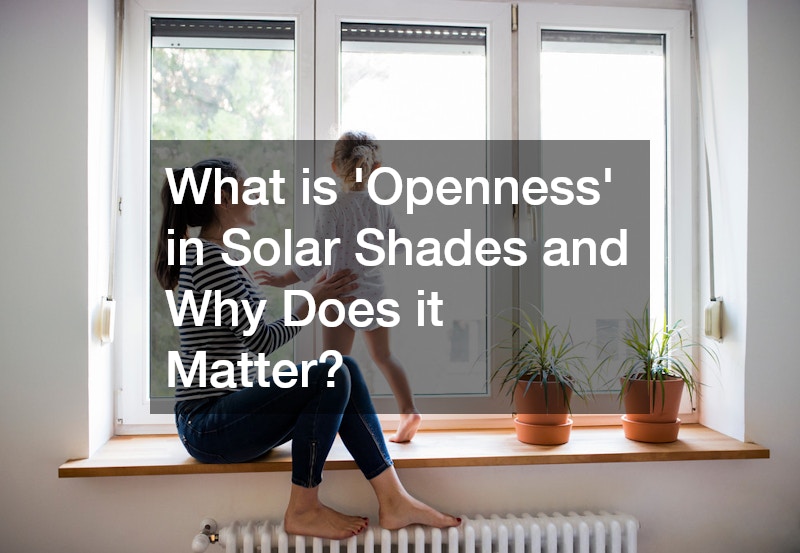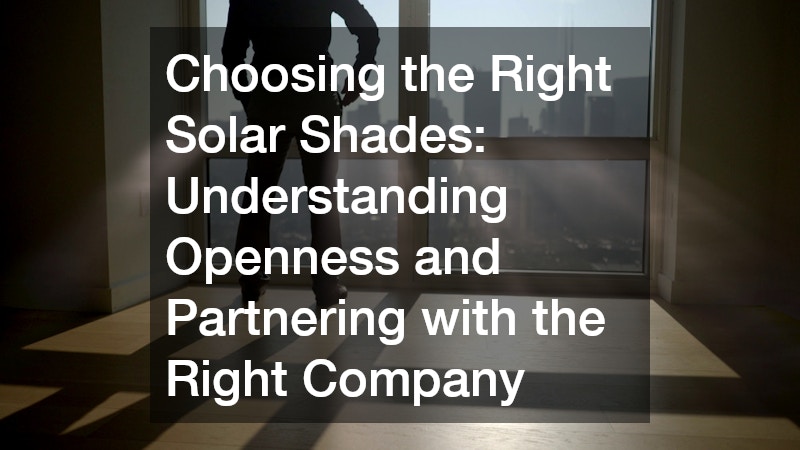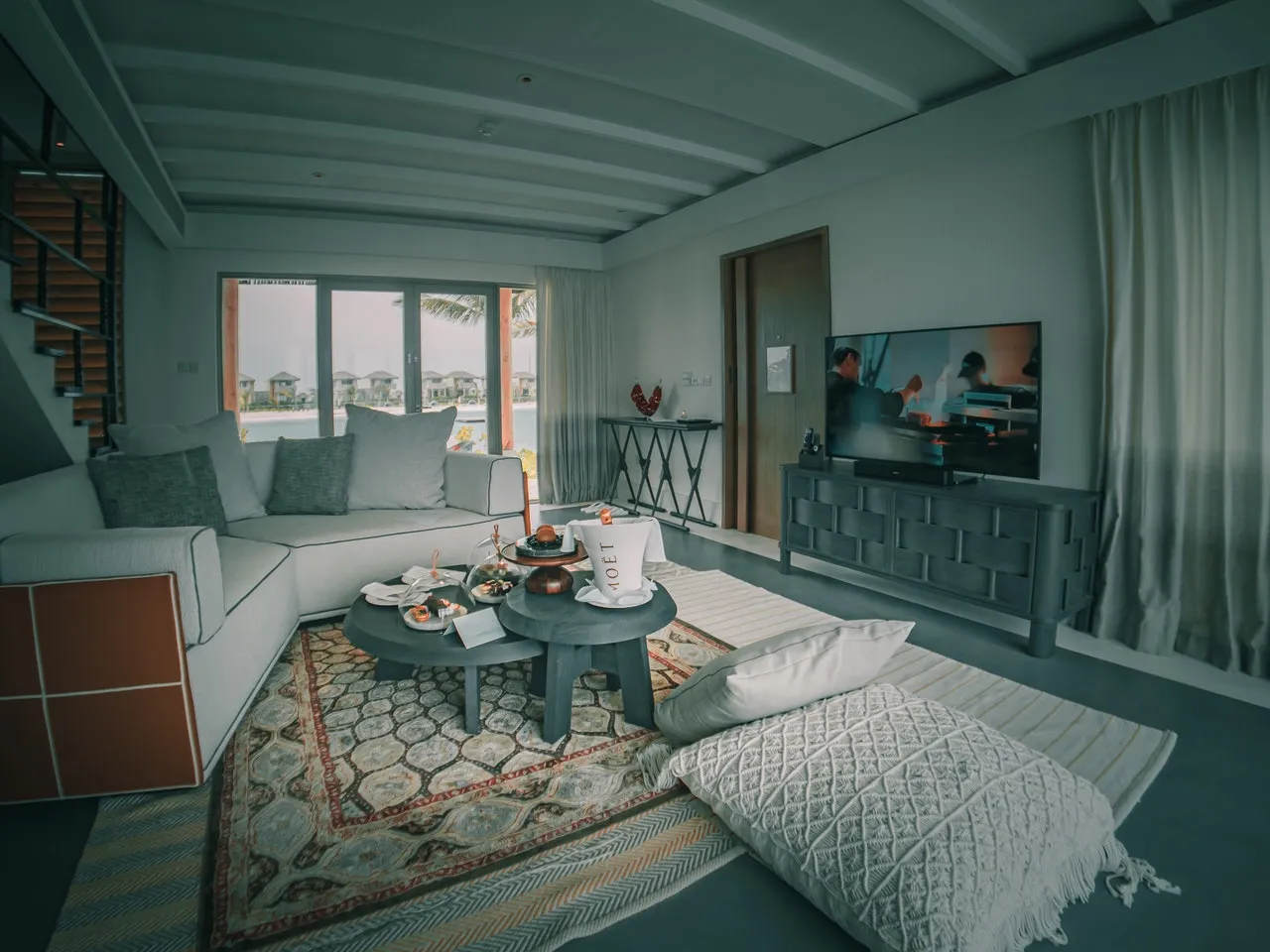Solar shades are an essential addition for homeowners looking to improve energy efficiency and comfort. This article will help you understand the concept of ‘openness,’ how it impacts your choices, and guide you in collaborating with the right company for your solar shade installation. By delving into these aspects, you can make an informed decision that enhances both the aesthetic appeal and functionality of your living space.
What is ‘Openness’ in Solar Shades and Why Does it Matter?
The openness factor in solar shades is a critical measurement that determines how much natural light is allowed to pass through the fabric. It is defined as the percentage of open space in the weave of the shade fabric.
For instance, a shade with a 5% openness factor means that 5% of the fabric is open for light to penetrate, balancing visibility and privacy.
Understanding this factor helps homeowners select shades that align with their light and privacy preferences. Higher openness factors allow more light and a clearer view outside, but lower privacy. Conversely, lower openness factors provide more privacy but less natural light and outside visibility.
The openness factor plays a significant role in determining the energy efficiency of a home. Shades with lower openness factors are more effective in reducing heat gain, which is crucial in hot climates. This translates into lowered air conditioning costs and increased energy savings during peak summer months.
Higher openness factors may not provide the same level of heat control but are beneficial in areas where maintaining a connection with the outdoors is essential. Windows with solar shades boasting higher openness allow more heat to escape during winter, necessitating a balance in energy strategy. By selecting the right openness based on climate and room orientation, homeowners can optimize their energy usage.
This strategic choice significantly impacts energy bills over the long term. It’s important to consider the trade-off between energy savings and the desired level of natural lighting. In fluctuating climates, selecting dual openness shades may offer versatility across seasons.
How to Evaluate Solar Shade Material and Quality
Solar shades are crafted from a variety of materials, each offering distinct benefits and drawbacks. Common materials include PVC-coated polyester and fiberglass, appreciated for their durability and ease of cleaning. Additionally, natural fabrics such as bamboo and linen are popular for their eco-friendly appeal and aesthetic quality.
PVC-coated polyester is resistant to moisture and fading, making it ideal for humid climates. Fiberglass offers similar benefits but with a lighter weight, providing easier installation. Natural materials, while environmentally sustainable, may require more maintenance to retain their appearance and functionality over time.
The choice of material impacts not only the longevity of your shades but also their environmental footprint. Considering each material’s appearance, maintenance needs, and durability will guide you in selecting the best material for your home. A balanced decision ensures longevity and satisfaction with your investment.
The longevity of solar shades depends largely on the material and quality of construction. Durable materials like fiberglass and PVC-coated polyester require minimal maintenance while offering extended lifespans. Regular cleaning with a damp cloth generally suffices to keep these shades in pristine condition.
Natural materials might demand more diligent care to prevent wear and tear, especially in high-sun and humid environments. Employing gentle cleaning solutions and regular inspections will prolong their durability without compromising their beauty. Investing in high-quality materials often reduces long-term maintenance burdens while ensuring consistent performance.
How to Choose the Right Company for Solar Shade Installation
Choosing the right solar shades company for installation begins with thorough research. Start by identifying companies with strong reputations and extensive experience in solar shade installations. Online reviews can provide invaluable insights into the reliability and customer satisfaction of potential installers.
Pay close attention to patterns in customer feedback, particularly concerning installation efficiency and after-sales service. A company with consistently positive reviews is likely to deliver an exceptional service experience. Evaluate case studies or testimonials to understand how companies align their services with customer needs and expectations.
Don’t hesitate to seek recommendations from friends, family, or online forums focused on home improvement. Personal experiences can reveal valuable insights into a company’s professionalism and expertise. Your deliberate and informed approach will ensure you select a partner capable of transforming your vision into reality.
Choosing solar shades is a significant decision that involves understanding openness, evaluating shade materials, and selecting a reputable installation company. By carefully considering these factors, you can ensure your solar shades improve your home’s energy efficiency and comfort effectively. An informed approach not only enhances functionality but also harmonizes aesthetics and environmental sustainability.



